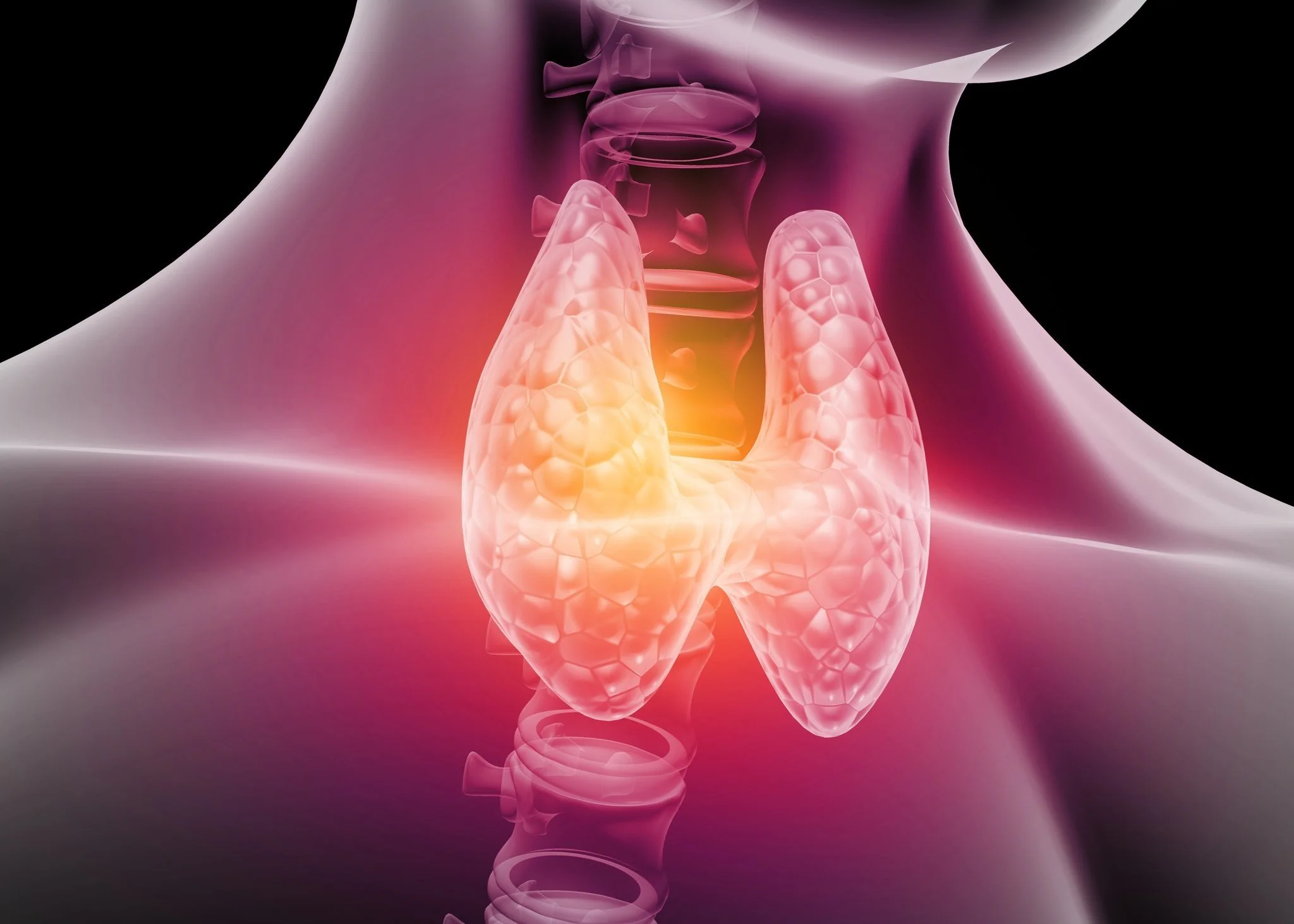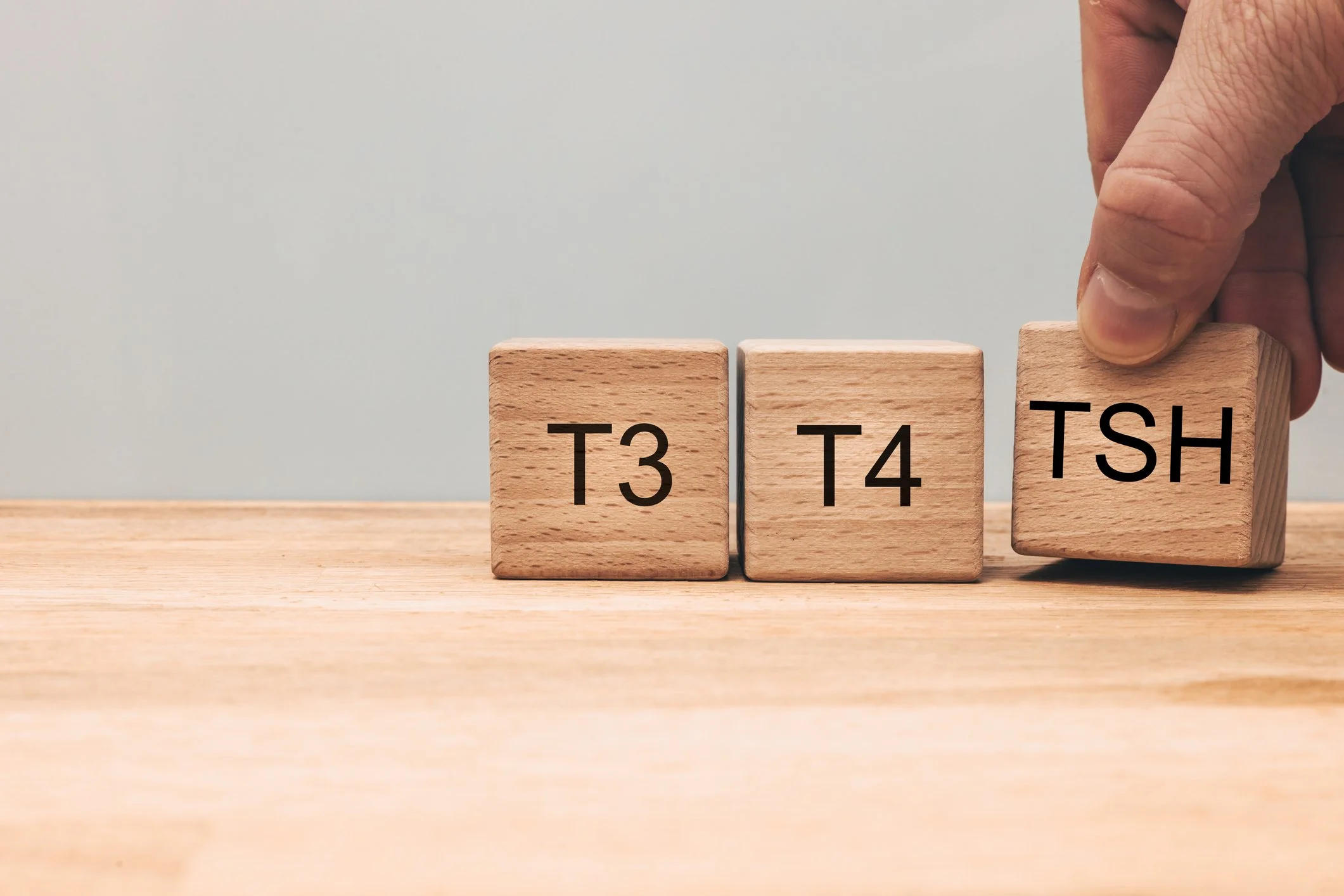Exhausted yet Thyroid Results are ‘Normal’? It Could Still be your Thyroid
Struggling with fatigue, brain fog, low mood, and/or weight gain, yet your thyroid blood test results always come back ‘normal’?
Is your TSH above the reference range but your T4 and T3 are still within the reference range?
Have a personal and/or family history of thyroid and/or autoimmune conditions?
If you have answered yes to any of the above questions, you may have subclinical hypothyroidism, an early stage of low thyroid function, which can cause symptoms long before your thyroid hormone levels fall outside of the ‘normal’ range.
You can have a ‘normal’ thyroid test result and still feel unwell
You are not imagining it, low thyroid function symptoms can occur with ‘normal’ thyroid test results, and include:
fatigue despite adequate sleep
difficulty focusing, forgetfulness, and/or poor word recall
low mood, including irritability, depression, and anxiety
an increase in weight with no change to your diet or exercise regime.
What is subclinical hypothyroidism?
Over one million Australians are living with an undiagnosed thyroid condition
Many may have subclinical hypothyroidism which occurs when your TSH levels are elevated, but your other thyroid hormone levels, T4 and T3, remain within the ‘normal’ reference range.
Subclinical hypothyroidism can be asymptomatic and can often resolve on its own without the need for treatment.
However, many people begin to experience low thyroid function symptoms as their subclinical hypothyroidism slowly progresses over time to overt hypothyroidism where TSH, T4, and T3 all fall outside of the reference range.
During subclinical hypothyroidism, you are still able to make enough T4 and T3 hormones, but your thyroid must work extremely hard to do so. TSH is produced by the pituitary gland and acts as a whip for your thyroid. If your T4 and T3 levels are too low, the pituitary gland ‘cracks the whip’, producing moreTSH to increase hormone production.
Subclinical hypothyroidism can often be:
underdiagnosed - due to the limited testing options available to GPs under Medicare
misdiagnosed - especially in pregnant, post-partum, and perimenopausal women
undermanaged - even if you get a diagnosis, it is not always treated and the treatment does not address the main cause of low thyroid function, autoimmunity.
Underdiagnosis of subclinical hypothyroidism
Underdiagnosis of subclinical hypothyroidism often occurs because most GPs can initially test TSH only under Medicare for undiagnosed patients, even though medical research has shown that TSH alone does not always give a full picture of thyroid health.
If your TSH level is above the reference range, you need to ensure that your GP follows this up by also testing the two thyroid hormones, T4 and T3.
If T4 and/or T3 are outside of their reference ranges, you will be diagnosed with overt hypothyroidism and prescribed thyroxine, a synthetic form of T4 that your thyroid can no longer produce in adequate amounts, which will often significantly reduce your low thyroid symptoms.
If your T4 and T3 still remain within the reference range, you will be diagnosed with subclinical hypothyroidism.
Many GPs do not treat subclinical hypothyroidism, especially if there are no obvious low thyroid function symptoms. They will only monitor your thyroid levels until they fall outside of the range and then diagnose you with overt hypothyroidism and prescribe thyroxine.
However, if you have symptoms of low thyroid function like weight gain, low mood, fatigue, and brain fog, research shows that prescribing thyroxine at this subclinical stage can assist with symptom relief so you can feel better.
In Australia, subclinical hypothyroidism is often caused by an autoimmune condition, Hashimoto’s thyroiditis.
If you have Hashimoto’s thyroiditis, your immune system mistakenly attacks your thyroid gland, producing elevated levels of thyroid antibodies called TPOAb and TgAb.
These antibodies often appear in the blood well before your TSH level becomes elevated. This means a thyroid antibodies test can help you receive a diagnosis for subclinical hypothyroidism.
Unfortunately, many GPs do not routinely test these markers of Hashimoto’s thyroiditis, and you may not even know you have had your thyroid antibodies tested in the past.
This is because conventional medicine does not treat thyroid autoimmunity. When subclinical hypothyroidism is caused by Hashimoto’s thyroiditis, a GP’s usual approach is to monitor your TSH, T4, and T3 levels over time. A diagnosis of overt hypothyroidism and a prescription of thyroxine is typically only made when all three thyroid hormone levels fall outside the ‘normal’ range.
Autoimmune conditions often run in families. So, it is important to tell your GP if you or any family members have had autoimmune thyroid conditions like Hashimoto’s thyroiditis, post-partum thyroiditis, or Graves’ disease. You should also mention any personal and/or family history of other autoimmune conditions such as coeliac disease, rheumatoid arthritis, or type 1 diabetes. This information will encourage your GP to order thyroid antibody testing.
In summary, you need to ask your GP or naturopath to order the full panel of thyroid testing, TSH, Free T4, Free T3, and the thyroid antibodies, TPOAb and TgAb, to ensure you get a correct diagnosis of subclinical hypothyroidism.
If you suspect you have subclinical hypothyroidism but are struggling to get a diagnosis, I have written a blog post on how to get the full panel of thyroid testing ordered here.
Misdiagnosis of subclinical hypothyroidism
Women are up to ten times more likely than men to develop the most common cause of subclinical hypothyroidism in Australia, Hashimoto’s thyroiditis.
Hashimoto’s thyroiditis is often triggered during times of hormonal change, including pregnancy, the post-partum period, and in perimenopause. These are also the times when women with subclinical hypothyroidism tend to be frequently misdiagnosed.
Subclinical hypothyroidism is very common, yet its vague symptoms of brain fog, fatigue, low mood, and weight gain can often be misattributed.
For example, you may think you have ‘baby brain’ and are exhausted because you are pregnant. Your GP may also attribute your subclinical hypothyroidism symptoms of brain fog and fatigue to normal pregnancy symptoms.
You might believe you are tired because you just had a baby and that your low mood is due to the ‘baby blues’. Your GP could attribute the causes of your subclinical hypothyroidism symptoms of fatigue and low mood to sleep deprivation and post-partum depression. You could even be prescribed medication that is unsuitable for the treatment of low thyroid function, such as an antidepressant.
If you are going through perimenopause, you could think that your unexplained weight gain is just ‘middle-age spread’ and that your irritability is due to your shifting hormones. Your GP could also attribute your symptoms of weight gain and mood disturbance to this time of hormonal change, rather than the underlying cause of subclinical hypothyroidism.
Feeling exhausted, experiencing severe brain fog, suffering from extreme mood changes, and/or putting on weight rapidly despite no change to your diet or exercise regime is not normal.
I highly recommend you investigate further as undiagnosed and untreated subclinical hypothyroidism can have serious effects on your health.
Undiagnosed and untreated subclinical hypothyroidism:
during pregnancy can increase the risk of miscarriage and pregnancy complications as well as have adverse effects on your baby’s health
after giving birth can exacerbate post-partum depression symptoms as well as cause extreme fatigue that can both make it extremely difficult to care for your newborn baby
during perimenopause can worsen symptoms such as irregular, painful, and heavy periods as well as hot flushes and night sweats.
Undermanagement of subclinical hypothyroidism
Often a GP will offer no treatment for subclinical hypothyroidism. They will just keep monitoring your thyroid hormone levels and only prescribe thyroxine once you have been diagnosed with overt hypothyroidism.
However, if you are experiencing low thyroid function symptoms and/or have elevated thyroid antibodies, research shows that you could benefit from thyroxine treatment at this early stage of thyroid disease.
Talk to your GP about trialling thyroxine to assess if it will help reduce your low thyroid function symptoms. You need to give thyroxine at least 6 weeks to have full effect and your GP will order another thyroid function test at this time to monitor your levels. You may require either a decrease or increase in thyroxine and it can take 2-3 thyroid function tests for the GP to find your optimal dosage of thyroxine.
The correct thyroxine dosage for you will help to optimise your levels of T4 and T3 and can reduce low thyroid symptoms such as fatigue, brain fog, low mood, and weight gain. However, thyroxine does not treat the most common cause of subclinical hypothyroidism, the autoimmune condition, Hashimoto’s thyroiditis.
If you have Hashimoto’s thyroiditis, your low thyroid function symptoms may still occur after starting thyroxine as the primary issue is not with your thyroid itself, rather with your dysfunctional immune system that is attacking and slowly destroying your thyroid gland tissue.
Unfortunately, most GPs are not trained in how to treat thyroid autoimmunity, however naturopaths are well equipped and best placed to manage it.
I have written another blog post about how naturopathy can treat thyroid autoimmunity here.
Treating autoimmunity, the cause of your subclinical hypothyroidism, with naturopathy alongside taking thyroxine is the best way to help reduce low thyroid function symptoms and slow down the attack on your thyroid gland, so you can finally feel and stay well.
WANT TO FIND OUT HOW I TREAT THYROID CONDITIONS AND AUTOIMMUNITY?
As a naturopath, I can develop a personalised treatment plan for you to treat autoimmunity, a common cause of thyroid conditions, to help you feel energised, shift weight, and think clearly. Take a look at my Thyroid service page for more info…




